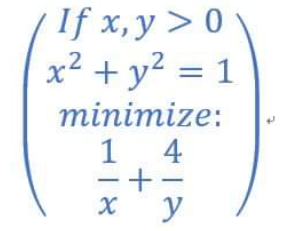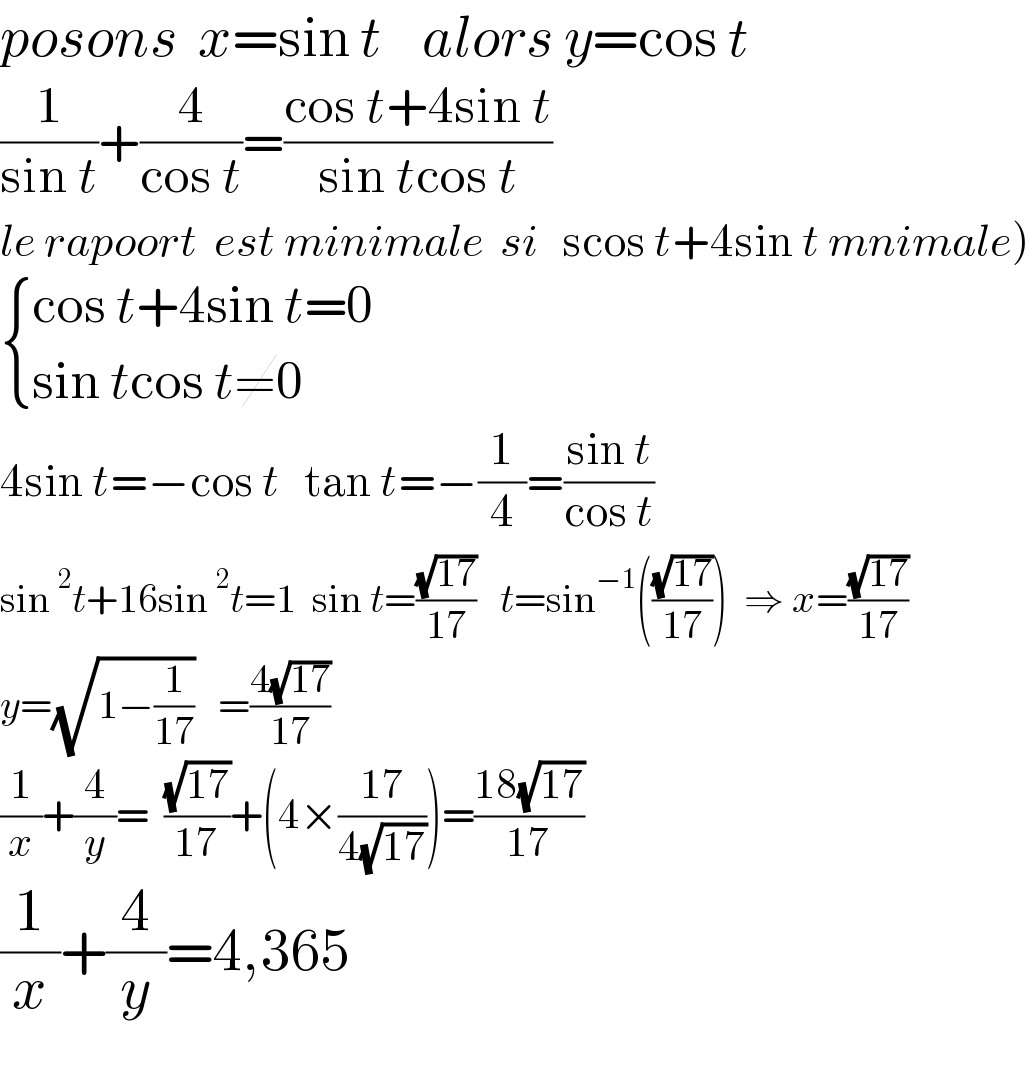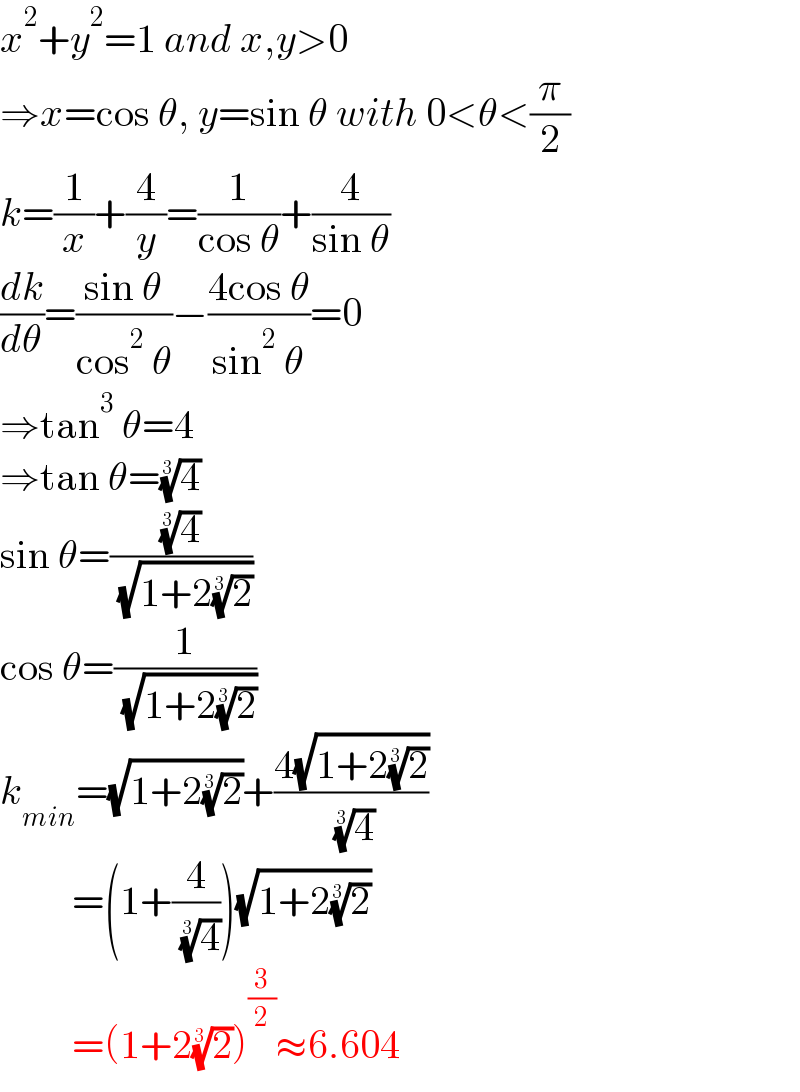
Question Number 177456 by cortano1 last updated on 05/Oct/22

Answered by a.lgnaoui last updated on 05/Oct/22

$${posons}\:\:{x}=\mathrm{sin}\:{t}\:\:\:\:{alors}\:{y}=\mathrm{cos}\:{t} \\ $$$$\frac{\mathrm{1}}{\mathrm{sin}\:{t}}+\frac{\mathrm{4}}{\mathrm{cos}\:{t}}=\frac{\mathrm{cos}\:{t}+\mathrm{4sin}\:{t}}{\mathrm{sin}\:{t}\mathrm{cos}\:{t}} \\ $$$$\left.{le}\:{rapoort}\:\:{est}\:{minimale}\:\:{si}\:\:\:\mathrm{scos}\:{t}+\mathrm{4sin}\:{t}\:{mnimale}\right) \\ $$$$\begin{cases}{\mathrm{cos}\:{t}+\mathrm{4sin}\:{t}=\mathrm{0}}\\{\mathrm{sin}\:{t}\mathrm{cos}\:{t}\neq\mathrm{0}}\end{cases} \\ $$$$\mathrm{4sin}\:{t}=−\mathrm{cos}\:{t}\:\:\:\mathrm{tan}\:{t}=−\frac{\mathrm{1}}{\mathrm{4}}=\frac{\mathrm{sin}\:{t}}{\mathrm{cos}\:{t}} \\ $$$$\mathrm{sin}\:^{\mathrm{2}} {t}+\mathrm{16sin}\:^{\mathrm{2}} {t}=\mathrm{1}\:\:\mathrm{sin}\:{t}=\frac{\sqrt{\mathrm{17}}}{\mathrm{17}}\:\:\:{t}=\mathrm{sin}^{−\mathrm{1}} \left(\frac{\sqrt{\mathrm{17}}}{\mathrm{17}}\right)\:\:\Rightarrow\:{x}=\frac{\sqrt{\mathrm{17}}}{\mathrm{17}} \\ $$$${y}=\sqrt{\mathrm{1}−\frac{\mathrm{1}}{\mathrm{17}}}\:\:\:=\frac{\mathrm{4}\sqrt{\mathrm{17}}}{\mathrm{17}} \\ $$$$\frac{\mathrm{1}}{{x}}+\frac{\mathrm{4}}{{y}}=\:\:\frac{\sqrt{\mathrm{17}}}{\mathrm{17}}+\left(\mathrm{4}×\frac{\mathrm{17}}{\mathrm{4}\sqrt{\mathrm{17}}}\right)=\frac{\mathrm{18}\sqrt{\mathrm{17}}}{\mathrm{17}} \\ $$$$\frac{\mathrm{1}}{{x}}+\frac{\mathrm{4}}{{y}}=\mathrm{4},\mathrm{365} \\ $$$$ \\ $$
Commented by mr W last updated on 05/Oct/22

$${it}'{s}\:{wrong}\:{sir}! \\ $$$${x}=\mathrm{cos}\:{t}\:>\mathrm{0} \\ $$$${y}=\mathrm{sin}\:\:{t}\:>\mathrm{0} \\ $$$$\mathrm{cos}\:{t}+\mathrm{4}\:\mathrm{sin}\:{t}>\mathrm{0}\:\:! \\ $$$${you}\:{can}'{t}\:{get}\:\mathrm{cos}\:{t}+\mathrm{4}\:\mathrm{sin}\:{t}=\mathrm{0}\:! \\ $$
Answered by mr W last updated on 05/Oct/22

$${x}^{\mathrm{2}} +{y}^{\mathrm{2}} =\mathrm{1}\:{and}\:{x},{y}>\mathrm{0} \\ $$$$\Rightarrow{x}=\mathrm{cos}\:\theta,\:{y}=\mathrm{sin}\:\theta\:{with}\:\mathrm{0}<\theta<\frac{\pi}{\mathrm{2}} \\ $$$${k}=\frac{\mathrm{1}}{{x}}+\frac{\mathrm{4}}{{y}}=\frac{\mathrm{1}}{\mathrm{cos}\:\theta}+\frac{\mathrm{4}}{\mathrm{sin}\:\theta} \\ $$$$\frac{{dk}}{{d}\theta}=\frac{\mathrm{sin}\:\theta}{\mathrm{cos}^{\mathrm{2}} \:\theta}−\frac{\mathrm{4cos}\:\theta}{\mathrm{sin}^{\mathrm{2}} \:\theta}=\mathrm{0} \\ $$$$\Rightarrow\mathrm{tan}^{\mathrm{3}} \:\theta=\mathrm{4}\: \\ $$$$\Rightarrow\mathrm{tan}\:\theta=\sqrt[{\mathrm{3}}]{\mathrm{4}} \\ $$$$\mathrm{sin}\:\theta=\frac{\sqrt[{\mathrm{3}}]{\mathrm{4}}}{\:\sqrt{\mathrm{1}+\mathrm{2}\sqrt[{\mathrm{3}}]{\mathrm{2}}}} \\ $$$$\mathrm{cos}\:\theta=\frac{\mathrm{1}}{\:\sqrt{\mathrm{1}+\mathrm{2}\sqrt[{\mathrm{3}}]{\mathrm{2}}}} \\ $$$${k}_{{min}} =\sqrt{\mathrm{1}+\mathrm{2}\sqrt[{\mathrm{3}}]{\mathrm{2}}}+\frac{\mathrm{4}\sqrt{\mathrm{1}+\mathrm{2}\sqrt[{\mathrm{3}}]{\mathrm{2}}}}{\:\sqrt[{\mathrm{3}}]{\mathrm{4}}} \\ $$$$\:\:\:\:\:\:\:\:\:=\left(\mathrm{1}+\frac{\mathrm{4}}{\:\sqrt[{\mathrm{3}}]{\mathrm{4}}}\right)\sqrt{\mathrm{1}+\mathrm{2}\sqrt[{\mathrm{3}}]{\mathrm{2}}} \\ $$$$\:\:\:\:\:\:\:\:\:=\left(\mathrm{1}+\mathrm{2}\sqrt[{\mathrm{3}}]{\mathrm{2}}\right)^{\frac{\mathrm{3}}{\mathrm{2}}} \approx\mathrm{6}.\mathrm{604} \\ $$
Commented by Strengthenchen last updated on 05/Oct/22

$${how}\:{can}\:{get}\:{differential}\:{is}\:\mathrm{0}? \\ $$$${because}\:{it}\:{is}\:{a}\:{trigonometric}\:{value}? \\ $$$${get}\:\:{d}\left({c}\right)/{dx}=\mathrm{0}? \\ $$
Commented by Tawa11 last updated on 05/Oct/22

$$\mathrm{Great}\:\mathrm{sirs} \\ $$
Commented by Strengthenchen last updated on 06/Oct/22

$${thank}\:{a}\:{lot},\:\:\:{it}'{s}\:{perfect}\:\:{to}\:\:{use}\:\:{character}\:\:{of}\:\:{function} \\ $$
